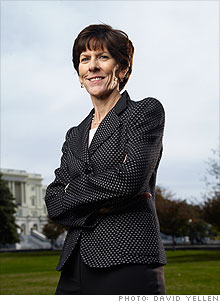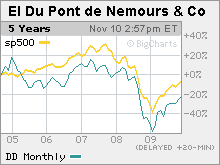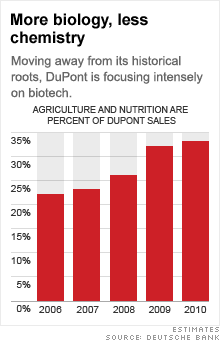The sustainability exec: DuPont's Linda Fisher
A report from the battlefield in the war on climate change.
 |
| Linda Fisher, chief sustainability officer of DuPont |


(Fortune Magazine) -- Being chief sustainability officer of a giant chemical company is a big job, but not for all the reasons you may think. DuPont CSO Linda Fisher must work hard to minimize the company's environmental footprint, but even nonmanufacturing companies now realize that the challenge is greater than they had imagined.
Think of all the airline miles that consultants rack up, for example. Besides, DuPont (DD, Fortune 500) is much less of a chemical company than it used to be, having transformed itself over the past decade into a broad-based science company with an emphasis on biotech.
The main reason Fisher's job is demanding is not environmental compliance issues, but rather its place at the center of the future economy, where DuPont and its competitors seek business opportunities and growing profits in making the planet greener.
Fisher, a lawyer, joined DuPont five years ago after 13 years with the Environmental Protection Agency, where, in the 1980s, she was in charge of developing the EPA's first position on climate change. She talked recently with Fortune's Geoff Colvin about coming climate regulation under President Obama, prospects for feeding the world, whether sustainability is possible in a recession, and much else. Edited excerpts:
Your title, chief sustainability officer, didn't exist more than a few years ago. What do you do?
A report that was issued in the '80s by an organization called the Brundtland Commission defined sustainability as meeting the needs of today without sacrificing future generations' ability to meet their needs. To DuPont that means looking at our major markets and seeing the megatrends that are going to affect those markets, and what are our opportunities to grow business.
So, for instance, we have a very big agricultural seeds and crop-protection business. A growing population is going to require that we become far more capable of producing corn and soybeans from limited acreage. My job is to help tie our business strategies with some of these megatrends so that we can identify growth opportunities.
That description would surprise a lot of people because they'd assume you're in charge of complying with environmental regulations and reducing the company's environmental footprint. But what you've talked about is the strategy of the business.
There's been a real evolution. My responsibility has two parts, and they reflect the way DuPont has evolved. The first is keeping our operations in compliance and going beyond that to reduce our footprint. The second part is the growth piece, and that is about finding market opportunities that are going to present themselves because of evolving societal needs.
That strategy is based on the idea that sustainability is something that customers will pay for. In some cases that's obviously true because you're increasing efficiency with better Pioneer corn seeds or Tyvek home wrap, for example. But does the strategy depend as well on more government constraints on energy and emissions?
First, are people willing to pay more for more sustainable products? By and large the answer is no. What our customers and their customers are looking for are products that are greener, more energy-efficient, but they'd like to keep the same price point. So they're demanding more.
That's really where we see our science and innovation coming into play -- what we like to see as the differentiator between some of our products and those of our competitors.
What's the role of government in that? There is a role. For example, we sell a lot of paint and coatings to the automobile industry. Some of the air standards in many parts of the world have required the companies that use our paint and coatings to get their VOC -- their volatile organic compounds -- down.
We've had to design new paint and coatings that make those companies far more able to comply with their local environmental regulations. So the government through the regulatory process kind of forced a demand for some of these products.
I was talking earlier this year with a consultant who told me he had doubts about the sustainability of sustainability, meaning that in a bad recession maybe a lot of customers and suppliers would stop caring. How valid is that concern?
We're not seeing that. Our markets are soft everywhere, but we are not seeing any softening in the demand for more sustainable products that differentiates it from the softening that we're seeing across all our markets.
It isn't a fad when you see it coming up through the marketplace, when consumers care. When DuPont is being asked by many of our customers to supply a different kind of material, that tells me it's real. It's not just driven for advertisement or marketing.
People really are trying to figure out how to make their businesses greener, more energy-efficient, more water-efficient, less toxic, with less waste. Those are real cost issues and market issues. So I think it's going to be sustainable.
The Obama administration promises to be much more activist than the Bush administration on environmental regulation. Has your life changed so far?
The EPA has stepped up its enforcement activities, and obviously that's made all of us step up our game. DuPont prides itself on compliance with environmental standards, but knowing that the regulator is maybe a little bit more aggressive just makes you play your game a little bit better.
In June the House passed a climate bill that would create a cap-and-trade system for greenhouse gases and would give rather than sell to businesses most of the emission permits in the early years. Is that a good system?
I think it is. The two major approaches to dealing with greenhouse gases are some sort of cap-and-trade program, and a tax. All the economists support the tax, and as you can imagine, increased taxes are politically very, very tough to do. I sometimes wonder if the folks who support the tax realize it's not really going to happen.
The cap-and-trade approach, I think, is complex but solid. It is a better way to assure that you will actually get your emissions down. With a tax, you're just hoping the increased price is going to result in that.
The trade part of cap and trade allows you to take your greenhouse gas reductions in the most cost-effective way. We've had a lot of success under the Clean Air Act with a cap-and-trade program that focused on the utilities, in getting sulphur dioxide down.
That was passed in the 1990s, and it achieved its environmental objectives in a far more cost-effective way than was envisioned at the time the legislation was passed. So we've had some experience with it.
Greenpeace and Friends of the Earth did not support the House bill that passed in June because they said it was a giveaway to polluters, since the emission permits would initially be given to them. Do they have a point?
As with every piece of legislation, you've got to bring many diverse parties together. I believe the legislation that passed the House still needs a lot of work, but I'm probably not where the environmental community is on it. It really is trying to balance the needs of industry and the economy with the needs of the environment. The two objectives tug at each other.
Regardless of what you favor, if Ellen Kullman, your CEO, asked you for the most realistic outlook for climate legislation, what would you tell her?
I would tell her not 2009. There is a very good chance in 2010, and if they don't pass it in 2010, I sense it will probably hold over to 2012. There's a history of passing environmental legislation in an election year when the Congress has made a lot of progress that they don't want to lose if they don't get it passed by the end of the session. So things do tend to pass in the even-numbered year.
What happens when goals conflict? For example, a new report from the Worldwatch Institute says that livestock production generates more greenhouse gases than all other human-caused sources combined. Now if more efficient corn from DuPont causes livestock production to increase because the feed is less expensive, are you making the world more sustainable or less?
I would look at it a little bit differently. The fact is, we have a growing population. By 2050, we project that we'll have about 9.3 billion people. Many people in the agriculture community believe we're going to have to double the productivity of land to meet those needs. Whether those people are eating beef or pork from animals or they're eating soy, the fact is, we're going to have to become much more productive, and we need to do that in a sustainable way.
How are investors regarding this whole strategy? Over the past five years, DuPont stock has underperformed the S&P by about 20%. Is the market not buying the idea that sustainability is a strategy that delivers financial results?
I think the market is taking a little bit of a wait-and-see approach. There's a lot of enthusiasm in the market for our agriculture business. They absolutely see the need for more productive agriculture as a big source of demand. They are beginning to see the demand for photovoltaic cells as one that DuPont's going to continue to be a leader in. But overall, as you talk to the big investors about sustainability, it's still a little bit more wait and see.
There's a giant U.N. climate conference in Copenhagen in December. Will anything significant happen?
Isn't that the question of the month? Six months ago, I think people were hopeful the U.S. would have a really solid position to take into those negotiations, and that has not come to pass.
Given the economy and the President's focus on health care, we won't have a climate bill, so the U.S. position will be softer than some people had hoped. You might see a different timeline agreed to that will give everybody a little bit more opportunity to get their plans together.
It's unfortunate to have an administration that, I think, is sincerely committed to doing something about climate come into power at the same time the economy tanked. Those are hard to deal with together. So for all of the hope that we finally would have an administration that would put this in the forefront, the fact is, we've got to get the economy back on its feet.
So it's the wrong moment.
It's the wrong moment -- although if you look at DuPont's strategic plan, there's a lot of growth in the technologies that this country and the world are going to need to combat climate change. A lot of the technologies that you would bring to market to reduce your dependence on fossil fuels and would want for energy security and energy price reasons, they are the same technologies that you would want to address climate change.
Barring a scientific breakthrough, does ethanol have a future? It doesn't seem to make economic sense as it is.
We think there are science and innovation breakthroughs that are just around the corner. We are very active in two ways, first in bringing cellulosic ethanol to the market. That's getting people off corn grain-based ethanol and using cellulose -- the corncob, switchgrass, or other fibrous materials -- as the feed stock.
We believe we'll have our pilot-scale cellulosic-ethanol plant come online next year, and we hope to commercialize by 2012. So we think cellulosic ethanol is really around the corner.
We also have a lot of research underway on biobutanol. That's a different alcohol fuel, and it has a lot of advantages that ethanol does not have. It has a higher fuel content -- more oomph.
You can transport it through pipelines, so it's much more efficient for the oil companies to use. It has fewer VOCs [volatile organic compounds], so you have less of an emissions issue with it. It can be blended very readily with gasoline, which is one of the challenges with ethanol. We think it'll be a great advanced biofuel.
Where does it come from?
We're looking at sugar cane as well as corn, and down the road we hope to be able to make biobutanol out of cellulosic materials.
How far is it from being economically competitive?
We're in a joint venture with British Petroleum (BP), and we hope to have our pilot plant online sometime next year.
As companies respond to these issues of sustainability, as they become more of the societal norm, does the job of chief sustainability officer disappear?
Interesting you should say that. DuPont had Tom Friedman, the columnist and author, come speak to our corporate officers about a year ago, and in the middle of his speech he turned to me and said, "The goal of DuPont should be to make Linda's job a dinosaur." I think it's a ways off before that happens.
Ultimately, if companies have completely ingrained sustainability into their strategy, you could say you probably don't need a chief sustainability officer. But sustainability is a constantly evolving concept.
If you had talked to folks at DuPont in 1970, although "sustainability" wasn't really used then, we focused on environmental compliance. By the '80s we were focusing on footprint reduction; in the '90s, energy efficiency. We were ahead of a lot of companies looking at greenhouse gas reduction. More recently, in the past several years, we've been looking at what our products can do to improve society's impact on the environment.
So it's been 40 years of an evolving topic, and I see part of my job as keeping DuPont at the forefront of that evolution. It's not going to stop with where we are now. If you and I were sitting here in 10 years there probably would be a whole new wave of sustainability. It will always evolve, and that futuristic piece is an area that somebody in the chief sustainability officer role will need to have.
You've spent your entire career on the environment. Where did your interest come from?
I went to college in the '70s, and I remember my father and I were standing at the living-room window looking out, and I said to him, "You know, I think I might get involved in the environmental movement."
And at the time, the Vietnam war was going on, and there were all these college protests, and police would be out in riot gear, and folks would be having their heads beat in. And my father looked at me and said, "Well, I think that's a very safe area for you to go in."
Suppose somebody who's in college today feels deeply committed to the idea of sustainability. Back when you and I were college students, those people might well have gone to law school, as you did. How would you advise such a person today?
You're exactly right -- years ago the focus was on regulation. Today I don't care what your academic background is, there's probably an opportunity for you in the area of sustainability.
The folks we hire in marketing have a real interest in the marketing around sustainability. Our public affairs and communications people are very involved. Definitely people who have environmental sciences and legal backgrounds are involved. No matter where you want to work, you can find an opportunity around sustainability.
It's been mainstreamed.
Yes. When I graduated from law school, I said to my brother I was going into environment regulation. He smiled at me -- he's a corporate lawyer -- and he said, "Environmental law, well, that's a nice niche practice."
Today environmental issues are everywhere, and it isn't a niche practice. It's actually one of the fundamental strategies of big business. ![]()
-
 The retail giant tops the Fortune 500 for the second year in a row. Who else made the list? More
The retail giant tops the Fortune 500 for the second year in a row. Who else made the list? More -
 This group of companies is all about social networking to connect with their customers. More
This group of companies is all about social networking to connect with their customers. More -
 The fight over the cholesterol medication is keeping a generic version from hitting the market. More
The fight over the cholesterol medication is keeping a generic version from hitting the market. More -
 Bin Laden may be dead, but the terrorist group he led doesn't need his money. More
Bin Laden may be dead, but the terrorist group he led doesn't need his money. More -
 U.S. real estate might be a mess, but in other parts of the world, home prices are jumping. More
U.S. real estate might be a mess, but in other parts of the world, home prices are jumping. More -
 Libya's output is a fraction of global production, but it's crucial to the nation's economy. More
Libya's output is a fraction of global production, but it's crucial to the nation's economy. More -
 Once rates start to rise, things could get ugly fast for our neighbors to the north. More
Once rates start to rise, things could get ugly fast for our neighbors to the north. More









